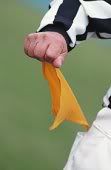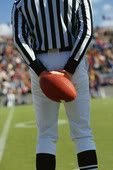 I saw this article and thought it would be worth sharing.... I remember some of these sports moments so some are nice to re-live and others are not.
I saw this article and thought it would be worth sharing.... I remember some of these sports moments so some are nice to re-live and others are not.
Number 10
Pittsburgh Steelers vs. Detroit Lions
1998 NFL Thanksgiving Game
Referee: Phil Luckett
A referee is always ribbed about his questionable vision, but for NFL official Phil Luckett, it was one of his other four senses that malfunctioned during an overtime coin toss. Steelers running back Jerome Bettis distinctly called “tails” and his declaration was heard through field audio. But when the coin landed with “tails” facing up, Luckett awarded the ball to the Detroit Lions.
Outcome: The Steelers kicked off in overtime and never saw the ball again. Detroit would drive down the field and kick the game-winning 42-yard field goal.
Number 9
Green Bay Packers vs. San Francisco 49ers
1998 NFL Wild Card Game
Referee: Gerald Austin
In San Francisco 49ers lore, there are two last-second, heroic touchdown receptions simply known as The Catch and The Catch II -- the latter of which should never have happened. Down by four points, the 49ers moved into Packer territory with less than one minute remaining. On a second-down play, Jerry Rice made a reception on a short crossing route and fumbled. Replays showed that the ball had slipped from Rice’s grasp before either of his knees had made contact with the ground, but the official ruled that Rice was down prior to losing control of the ball.
Outcome: The 49ers completed the comeback as quarterback Steve Young picked out Terrell Owens between five Packer defenders on a miraculous 25-yard touchdown with three seconds left.
Number 8
Kansas City Royals vs. New York Yankees
1983
Referee: Tim McClelland
If being the first baseball player to attain 3,000 hits, 300 home runs, 600 doubles, 100 triples, 1,500 runs batted in, and 200 stolen bases isn’t enough to be remembered for, how about a terrific temper tantrum? When third baseman George Brett of the Royals gave his team a 5-4 lead with a ninth-inning two-run home run, Yankees manager Billy Martin protested to the home plate umpire, Tim McClelland, that Brett had more than 18 inches of pine tar on his bat. After a quick measure, McClelland signaled Brett out and awarded the Yankees a victory. Brett stormed out of the dugout and had to be physically restrained from a face-to-face confrontation with McClelland.
Outcome: The Royals obviously felt robbed and protested. American League President Lee MacPhail upheld their objection, stating that an umpire could only remove the bat from the game and could not call the batter out. The remainder of the game was to be completed later in the season, beginning after Brett’s home run. The Royals would hold on for a 5-4 victory.
Number 7
Atlanta Braves vs. Minnesota Twins
1991 World Series
Referee: Drew Coble
Bigger isn’t always better, but in Game Two of the 1991 World Series, Twins first baseman Kent Hrbek proved a case where it was. After Braves hitter Ron Gant singled, he took a wide turn as he rounded first base. The Twins' fielders took note of this and relayed back to first, where Gant returned safely, but slightly off balance. The 250-pound Hrbek applied a pretty fierce tag, essentially pushing the 170-pound Gant off the bag. First base umpire Drew Coble claimed that Gant’s momentum pulled him off the base and called him out.
Outcome: Gant and manager Bobby Cox vehemently protested to no avail. The Braves lost Game Two by one run and would drop the Series in seven games.
Number 6
Utah Jazz vs. Chicago Bulls
1998 NBA Finals
Referees: Dick Bavetta, Dan Crawford, Hue Hollins
Michael Jordan is widely considered one of the best guards in NBA history. Armed with an explosive first step and an impeccable ability to change direction at will, Jordan could always create space for his shot. But in the 1998 Finals, with his Chicago Bulls down by one point to the hometown Utah Jazz and with less than 10 seconds remaining, Jordan clearly pushed off defender Bryon Russell’s thigh for a clean look at the basket. Russell fell to the ground and Jordan easily drained the 20-foot jumper.
Outcome: Since the Jazz failed to score on their next and final possession, Jordan’s shot proved to be the clinching shot of the series and is now one of the most memorable moments in NBA Finals history. Number 5 Baltimore Orioles vs. New York Yankees
Number 5 Baltimore Orioles vs. New York Yankees
1996 American League Championship Series
Referee: Rich Garcia
Before Steve Bartman, there was Jeffrey Maier. While both of these passionate fans sat near the live boundaries of play and interfered, Maier was the one who helped his own team. In the bottom of the eighth inning during Game One, the Bronx Bombers were trailing 4-3. Yankees shortstop Derek Jeter launched a fly ball that was going to bounce off the top of the right field wall, just inches short of a home run, but Maier stuck his glove out and helped the ball over the fence. Although right field umpire Rich Garcia rushed down the line to get a better view of the play, he missed the fan interference and ruled it a home run.
Outcome: Orioles right fielder Tony Tarasco was rightfully irate. Riding the momentum from the lucky play, the Yanks took Game One in extra innings and advanced in five games.
Number 4
Buffalo Sabres vs. Dallas Stars
1999 Stanley Cup Final
Referee: Bryan Lewis, NHL Supervisor of Officials
Sometimes the right decision is a tough decision, and in Game Six of the 1999 Stanley Cup Finals between the Dallas Stars and the Buffalo Sabres, the referees lacked the guts to make the correct ruling. In the third overtime, just 23 seconds short of the longest game in Finals history, Brett Hull’s skate was clearly in the crease as the game-winning goal was scored. The rule stated that a player could not be in the crease unless the puck was already there, and Hull was undoubtedly there prior to the puck’s arrival. As the Stars poured onto the ice to celebrate, the refs briefly reviewed the play and let it stand.
Outcome: The Sabres protested in their locker room, but the murky explanation handed down by Bryan Lewis was not agreeable. Shortly after the incident, the NHL would dismiss the much-maligned “skate in the crease” rule.
Number 3
Argentina vs. England
1986 World Cup Quarter-Finals
Referee: Ali Bin Nasser
They say the first time is the one you remember. For Argentinean soccer player Diego Maradona, his first goal against rival England would be the one every soccer fan would remember for life. As he challenged English goalkeeper Peter Shilton for a floating ball, he raised his hand over his head to punch the ball into the net. His nearby teammates didn't flinch, assuming the goal would be disallowed. But referee Ali Bin Nasser didn’t see the blatant handball and the Argentinean players rushed Maradona to sell the scene.
Outcome: Maradona would strike again three minutes later, leading Argentina to a 2-1 victory. They later captured their second-ever World Cup.
Number 2
Roy Jones Jr. vs. Park Si Hun
1988 Seoul Summer Olympics
Referees: Bob Kasule of Uganda, Alberto Duran of Uruguay and Hiouad Larbi of Morocco
Sometimes a play is too close to call and a judge is forced into a split-second decision. On the other end of the refereeing spectrum are barefaced blunders. Three boxing judges from the 1988 Seoul Summer Olympics are guilty of the latter: They awarded South Korean Park Si Hun a Gold Medal victory in front of his home crowd over Roy Jones Jr., even though the American treated him like a piñata. Jones Jr. landed 54 more punches, displaying uncanny hand speed. He would have knocked out Hun had the fight lasted any longer than three rounds, but the judges still awarded Hun a 3-2 decision.
Outcome: Jones Jr. became a Silver medalist and was perversely awarded the Val Baker award, given to the Olympics’ top boxer, while bribery conspiracies were kindled. The three judges who decided in favor of Hun were suspended, but after a lengthy International Olympic Committee investigation that concluded in 1997, no evidence of foul play was uncovered.
Number 1
St. Louis Cardinals vs. Kansas City Royals
1985 World Series
Referee: Don Denkinger
Missouri’s “Show-Me State” nickname derives from the people’s devotion to believing only what they can see. But in the Show-Me Series, a World Series matchup between Missouri’s two baseball teams, a certain umpire lacked vision. In Game Six, behind 3-2 in the series, trailing 1-0 in the game, and down to what appeared to be their last three outs in the ninth inning, the Royals received some help from first base umpire Don Denkinger. Jorge Orta of the Royals nubbed a slow roller on the infield grass, which was handled by first baseman Jack Clark. He picked it up and tossed it to pitcher Todd Worrell, who was covering first base. Although Worrell beat Orta by a step, Denkinger called him safe.
Outcome: The Royals rallied in the ninth inning to win Game Six and would bludgeon the Cardinals by a score of 11-0 in the seventh and deciding game.
Tags: Sited:
http://www.askmen.com
Resourses:
http://en.wikipedia.org - Phil Luckett
http://en.wikipedia.org - Green Bay
http://en.wikipedia.org - George Brett
http://en.wikipedia.org - NBA Finals Game 6
http://en.wikipedia.org - Jeffrey Maier
http://en.wikipedia.org - Roy Jones
http://en.wikipedia.org - Don Denkinger
http://archive.profootballweekly.com
www.youtube.com - Green Bay
www.youtube.com - Michael Jordan
http://sportsillustrated.cnn.com - pine tar
http://sportsillustrated.cnn.com - Diego Maradona
www.baseballhalloffame.org
www.baseball-statistics.com
www.nytimes.com
www.tsn.ca
http://proicehockey.about.com
http://nytimes.com
Top 10: Worst Referee Calls
Subscribe to:
Comment Feed (RSS)
















|